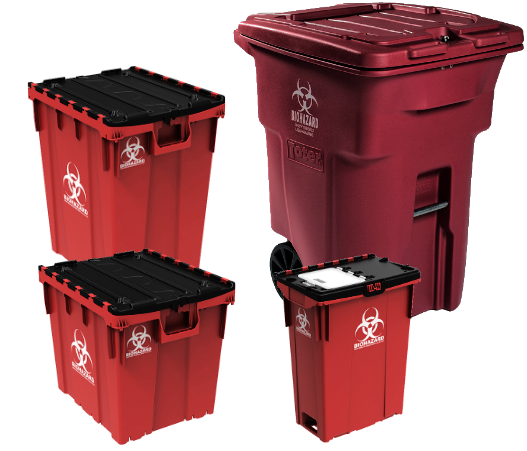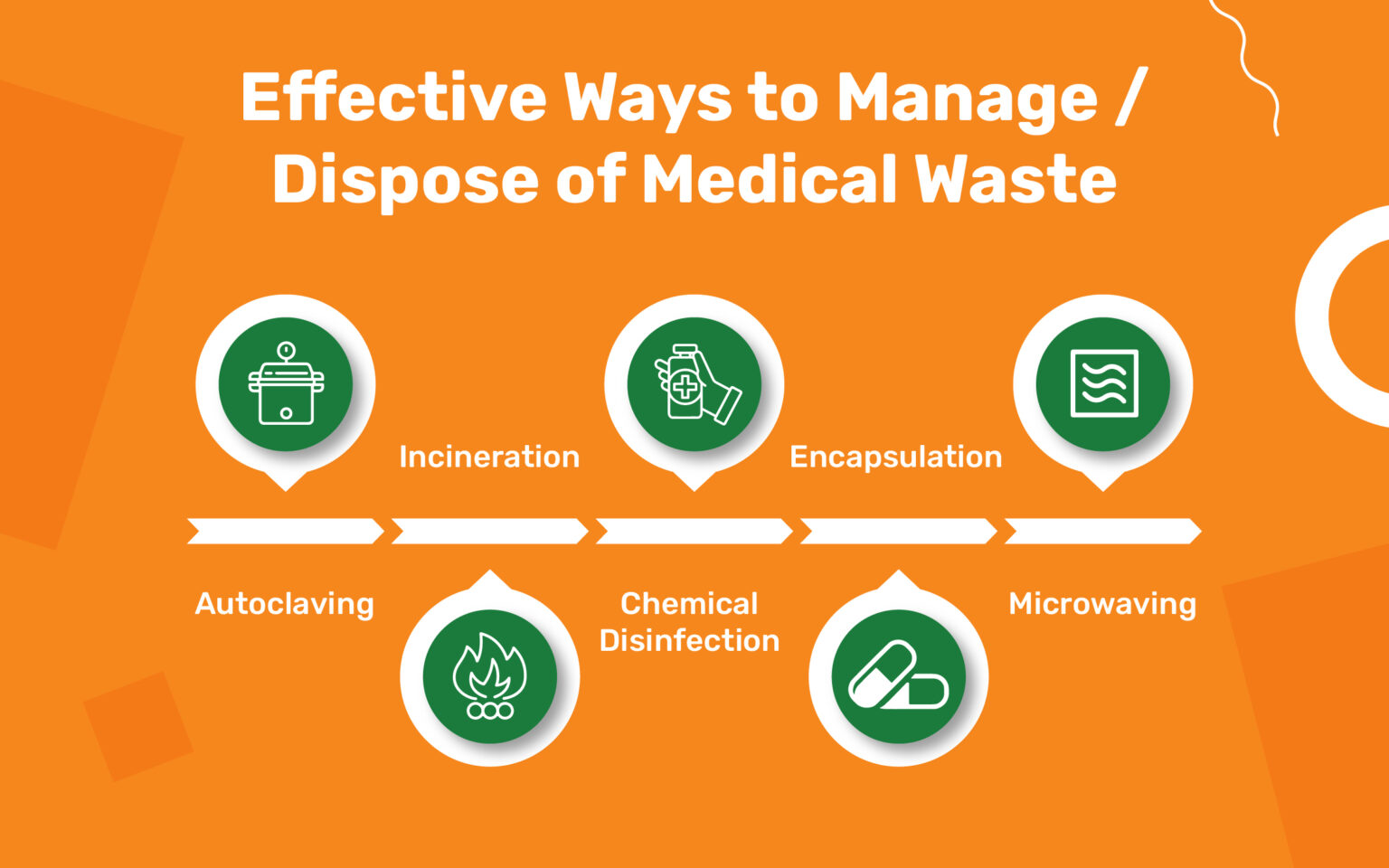Beyond Cleanup: Ensuring Security with Expert Medical Waste Removal
Beyond Cleanup: Ensuring Security with Expert Medical Waste Removal
Blog Article
Keep Ahead of Regulations: Expert Recommendations on Medical Garbage Disposal
In a globe where the healthcare industry is regularly advancing, it is important for medical facilities to remain in advance of laws when it involves the proper disposal of medical waste. With stringent guidelines and frequent governing adjustments, it can be testing to browse the intricacies of this procedure. Nonetheless, with expert advice, facilities can ensure compliance and mitigate risks associated with improper garbage disposal. From comprehending the different categories of clinical waste to applying the ideal collection and segregation techniques, this discussion will certainly supply workable tips and valuable understandings to assist centers remain in advance of guidelines in the ever-changing landscape of medical garbage disposal.
Understanding Clinical Waste Categories
Understanding medical waste groups is necessary for proper disposal and administration in healthcare facilities. Clinical waste describes any waste produced by health care tasks that may present a threat to public health and wellness or the setting. It is important to classify medical waste precisely to guarantee its safe handling, treatment, transport, and disposal.
There are several classifications of clinical waste that healthcare facilities need to be acquainted with. One of the most common classifications include transmittable waste, pathological waste, sharps waste, pharmaceutical waste, and chemical waste. Each group has specific guidelines and guidelines for its correct monitoring and disposal.
Pathological waste refers to human tissues, body organs, or body components that need special handling and disposal. Pharmaceutical waste comprises expired, extra, or infected medications that need careful handling and disposal.
Staying Up-To-Date With Regulatory Changes
Remaining existing with regulative changes is essential for healthcare centers to make certain conformity and appropriate management of clinical garbage disposal. medical waste removal service. With regulations frequently advancing, it is necessary for health care facilities to remain updated to avoid fines, fines, and possible damage to the environment and public wellness
To stay ahead of governing modifications, healthcare centers ought to develop a system for tracking and monitoring updates. This can be done by signing up for regulatory e-newsletters, attending meetings and workshops, and proactively taking part in industry associations. In addition, centers must assign an employee or team in charge of staying educated and disseminating info to pertinent stakeholders.
Routine communication with regulative companies is also crucial. Healthcare centers need to establish partnerships with local, state, and federal firms to ensure they know any kind of modifications in guidelines that might impact their waste monitoring techniques. This can be done through routine conferences, participation in public remark periods, and positive involvement with governing agencies.
Moreover, healthcare facilities must take into consideration partnering with waste administration firms that focus on clinical waste disposal (medical waste disposal services with WasteX). These firms are frequently skilled in the most recent regulations and can offer support and assistance to make certain conformity
Implementing Proper Collection and Segregation Techniques
To successfully handle clinical garbage disposal, health care centers need to develop appropriate collection and partition techniques based on regulative guidelines. Executing these techniques guarantees the risk-free handling and disposal of potentially hazardous materials, shields the atmosphere, and reduces the danger of infections and injuries to health care workers and the general public.
Proper collection and partition approaches include using designated containers and labeling systems. Medical care centers need to supply plainly labeled containers for different sorts of clinical waste, such as sharps, contagious waste, pharmaceutical waste, and non-hazardous waste. These containers should be color-coded and plainly significant to prevent confusion and advertise simple identification.
In addition, health care facilities should educate their personnel on the correct treatments for gathering and segregating clinical waste. This includes enlightening them on the various kinds of waste, the ideal containers to utilize, and the significance of adhering to laws and guidelines. Regular training sessions and refresher course courses need to be carried out to ensure that employee stay up-to-date on ideal practices.
In addition, healthcare facilities need to establish a system for normal collection and disposal of medical waste. This might entail partnering with accredited waste monitoring business that concentrate on medical garbage disposal. These companies will make certain that the gathered waste is moved and thrown away in compliance with regulatory needs.
Picking the Right Disposal Methods

Incineration is just one of the most common and effective techniques for disposing of particular kinds of clinical waste, such as pathological waste and sharps. It involves the regulated combustion of waste at heats, lowering it to ash. Nonetheless, incineration can release unsafe pollutants right into the air and add to air pollution.

Other disposal techniques include chemical treatment, microwave treatment, and landfilling. Chemical treatment includes making use of chemicals to reduce the effects of the waste and sanitize. Microwave therapy makes use of microwave power to heat and decontaminate the waste. Homepage Landfilling involves hiding the waste in a designated land fill location (medical waste disposal services with WasteX). Nonetheless, landfilling needs to be the last resort as a result of the possible risk of contamination to soil and groundwater.
Making Certain Conformity With Documentation and Training
After carefully considering the suitable disposal techniques for clinical waste, healthcare centers must ensure conformity with laws and lessen environmental impact by implementing effective documents and training treatments. This step is essential in preserving a secure and sustainable atmosphere for both health care employees and the general public.

Training is similarly crucial in making sure compliance with regulations. Healthcare workers that deal with medical waste needs to get ideal training on waste partition, taking care of, and disposal treatments. This training must cover topics such as the correct use personal protective equipment, recognition of various kinds of waste, and the right disposal approaches for each waste classification. By offering comprehensive training, healthcare facilities can empower their team to make enlightened choices and decrease the threat of inappropriate garbage disposal.
Conclusion
In final thought, staying ahead of regulations in medical waste disposal is vital for medical care centers. medical waste removal services. Understanding the various categories of clinical waste, remaining updated with regulative modifications, carrying out appropriate collection and partition techniques, selecting the suitable disposal techniques, and making certain conformity through paperwork and training are all vital actions. By following these standards, healthcare companies can successfully handle and dispose of clinical waste in a secure and accountable fashion
From comprehending the different categories of clinical waste to implementing the best collection and partition approaches, this conversation will give workable tips and useful understandings to assist centers stay ahead of guidelines in the ever-changing landscape of clinical waste disposal. - medical waste disposal services with WasteX
The most common groups consist of transmittable waste, pathological waste, sharps waste, pharmaceutical waste, and chemical waste. Healthcare facilities must offer clearly labeled containers for various types of medical waste, such as sharps, transmittable waste, pharmaceutical waste, and non-hazardous waste. Healthcare facilities informative post must establish a detailed system to record and track all facets of clinical waste disposal, consisting of kinds of waste generated, amounts, and disposal methods used. Medical care employees who handle clinical waste ought to receive ideal training on waste segregation, dealing with, and disposal procedures.
Report this page